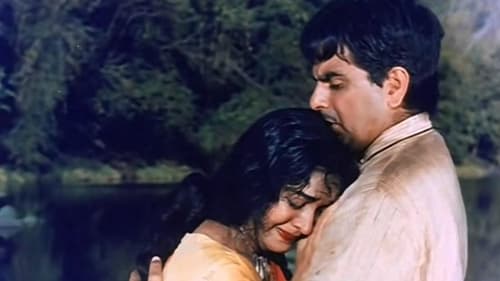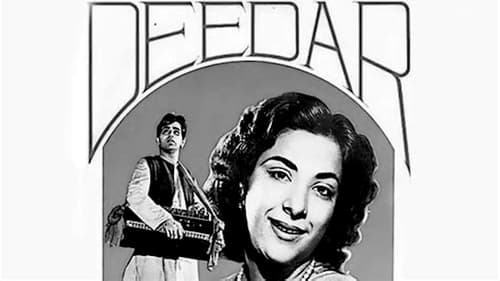Nitin Bose
Рождение : 1897-04-26, Calcutta - India
Смерть : 1986-04-14
История
An Indian film director, cinematographer and screenwriter of the nation's film industry. In the 1930s and early 1940s, he worked with New Theatres, who made bilingual movies: in both Bengali and Hindi. Later, he moved to Bombay and directed under the banners of Bombay Talkies and Filmistan. The first use of playback singing in Indian films occurred in films directed by Bose in 1935: first in Bhagya Chakra, a Bengali film, and later the same year in its Hindi remake, Dhoop Chhaon. His most well-known work is Ganga Jamuna. Satyajit Ray was a nephew of Bose and worked under him in the movie Mashaal (1950), which was produced by Bombay Talkies. Bose also mentored Bimal Roy

Director
A modern reformist professor helps a courtesan in her endeavour to achieve high academic level and respectability. They face open opposition and hostility by society but do not relent.

Director
Ганга и Джамна — два брата близнеца. Один — настоящий бандит, не щадящий ни чужих, ни своих. Второй брат — честен и благороден. Он борется за своего брата и любовь спасает и объединяет семью...

Director
In this Bollywood classic tearjerker, a romance for the ages blooms between the puppeteer Shivraj and the young admirer Pushpa after Shivraj loses the use of his hands and his livelihood. But love turns to resentment when Pushpa begins paying the bills with money made through her budding stage career. Will fierce pride keep them apart, or will Pushpa's faithful agent find a way to bring them together again?

Director of Photography
Сын богача Химмата Сингха Кунвар встречает в Бомбее бедную девушку Шобху и вопреки воле отца женится на ней. Возмущенный отец отказывает сыну в помощи, и Кунвар, не найдя работы, вынужден вступить в армию. Получив известие о гибели сына, Сингх приглашает Шобху с ребенком жить в его доме. На пути к нему Шобха попадает в аварию. Вместо нее в дом Сингха приезжает другая женщина с ребенком.

Director
Сын богача Химмата Сингха Кунвар встречает в Бомбее бедную девушку Шобху и вопреки воле отца женится на ней. Возмущенный отец отказывает сыну в помощи, и Кунвар, не найдя работы, вынужден вступить в армию. Получив известие о гибели сына, Сингх приглашает Шобху с ребенком жить в его доме. На пути к нему Шобха попадает в аварию. Вместо нее в дом Сингха приезжает другая женщина с ребенком.

Director
A traumatized and blind young man makes a living singing, and searching for his childhood sweetheart.

Writer
Uttam Kumar debuted in this film.

Director
Uttam Kumar debuted in this film.

Director
A young law student is forced into an arranged marriage though he is in love with somebody else. Following the wedding the drama focuses on the bride's mistaken identity and the search for her husband.

Director
Shiromoni, a village priest sends his son on an errand to the house of Mr. Mukherjee. On his return Kashinath discovers his father is no more. With no kin to support him Mr. Mukherjee suggests that Kashinath should move over to live with Mr. Pitambar Chakraborty, the zamindar [Landlord]. Kashinath however, is in no mood to leave Mr. Mukherjee's home as he has started to grow attached to Mukherjee's daughter Bindu.

Writer
A famous radio singer Mohan (Saigal) is in love with Geeta (Leela Desai). When he goes to his friend a doctor, TB Specialist, Bijoy (Bhanu) for a check-up, he is found to be in an advance stage of TB. Meanwhile Leela's dominant mother and aunt (Nibhanani and Manorama) had been against the poor Mohan and had set their eyes on same Dr. Bijoy, the son of a family friend. When Mohan comes to know of it, and also his sickness, he decides to walk away from them. He is intercepted by a doctor who ran a sanatorium for TB patients, with some new method of treatment. Geeta couldn't forget Mohan and waited, but in the end she had to relent. Then it was known that Mohan was alive and cured. What would now Bijoy and Geeta do? There wedding was the next day, and they have to go ahead with it, the honour of both the families were at stake. Mohan too aware of his being exposed, disappears from the sanatorium and is untraceable.

Cinematography
A famous radio singer Mohan (Saigal) is in love with Geeta (Leela Desai). When he goes to his friend a doctor, TB Specialist, Bijoy (Bhanu) for a check-up, he is found to be in an advance stage of TB. Meanwhile Leela's dominant mother and aunt (Nibhanani and Manorama) had been against the poor Mohan and had set their eyes on same Dr. Bijoy, the son of a family friend. When Mohan comes to know of it, and also his sickness, he decides to walk away from them. He is intercepted by a doctor who ran a sanatorium for TB patients, with some new method of treatment. Geeta couldn't forget Mohan and waited, but in the end she had to relent. Then it was known that Mohan was alive and cured. What would now Bijoy and Geeta do? There wedding was the next day, and they have to go ahead with it, the honour of both the families were at stake. Mohan too aware of his being exposed, disappears from the sanatorium and is untraceable.

Director
A famous radio singer Mohan (Saigal) is in love with Geeta (Leela Desai). When he goes to his friend a doctor, TB Specialist, Bijoy (Bhanu) for a check-up, he is found to be in an advance stage of TB. Meanwhile Leela's dominant mother and aunt (Nibhanani and Manorama) had been against the poor Mohan and had set their eyes on same Dr. Bijoy, the son of a family friend. When Mohan comes to know of it, and also his sickness, he decides to walk away from them. He is intercepted by a doctor who ran a sanatorium for TB patients, with some new method of treatment. Geeta couldn't forget Mohan and waited, but in the end she had to relent. Then it was known that Mohan was alive and cured. What would now Bijoy and Geeta do? There wedding was the next day, and they have to go ahead with it, the honour of both the families were at stake. Mohan too aware of his being exposed, disappears from the sanatorium and is untraceable.

Cinematography
A famous Saigal musical narrating a strange love story set against 1930s industrialization and worker-management relations. The 16-year-old Prabhavati inherits a mill and turns it into an extremely profitable enterprise. Prakash is a worker who designs a more efficient machine for the factory for which he first gets sacked and then is re-employed. He falls in love with Prabhavati's sister Sheila, who later makes way for Prabhavati who is also in love with Prakash. Her withdrawal distresses Prakash, causing him to bully the workers who then go on strike.

Director
A famous Saigal musical narrating a strange love story set against 1930s industrialization and worker-management relations. The 16-year-old Prabhavati inherits a mill and turns it into an extremely profitable enterprise. Prakash is a worker who designs a more efficient machine for the factory for which he first gets sacked and then is re-employed. He falls in love with Prabhavati's sister Sheila, who later makes way for Prabhavati who is also in love with Prakash. Her withdrawal distresses Prakash, causing him to bully the workers who then go on strike.

Cinematography
Badi Bahen aka President is a 1937 Hindi social romantic drama film (the Bengali version was called Didi and starred several different actors). The story according to the credit roll of the film is "A tale of love and greater love" developed on an idea by M. M. Begg. It was a love triangle with a social content that highlighted the conditions of the mill workers. It was also the first film to show a liberated educated woman managing her own factory

Writer
Badi Bahen aka President is a 1937 Hindi social romantic drama film (the Bengali version was called Didi and starred several different actors). The story according to the credit roll of the film is "A tale of love and greater love" developed on an idea by M. M. Begg. It was a love triangle with a social content that highlighted the conditions of the mill workers. It was also the first film to show a liberated educated woman managing her own factory

Director
Badi Bahen aka President is a 1937 Hindi social romantic drama film (the Bengali version was called Didi and starred several different actors). The story according to the credit roll of the film is "A tale of love and greater love" developed on an idea by M. M. Begg. It was a love triangle with a social content that highlighted the conditions of the mill workers. It was also the first film to show a liberated educated woman managing her own factory

Director
A remake of the Bengali film Bhagya Chakra, it was the first Hindi film to use playback singing. It was director Nitin Bose who came up with the idea of playback singing.

Director
The story revolves around the 15th century poet-saint Chandidas who acts out against the deep-rooted bigotry against caste, untouchability and the hypocrisy of society, as he falls in love with a washer woman.

Director of Photography
A simple recording of Tagore's 1926 dance drama on Buddhist legend.

Director of Photography

Director of Photography




